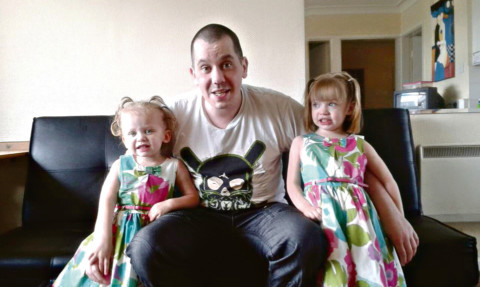
A mother whose H-bomb test veteran father developed two extremely rare brain conditions fears his genetic illnesses have been passed on to her son.
Scots-born Glenda Horsfall has joined a fight by the British Nuclear Test Veterans’ Association for descendents of men poisoned by radiation fallout.
Her 75-year-old father, Stanley Macdonald, was a senior RAF aircraftman during three atom bomb tests in the late 1950s in Maralinga, Australia.
He stood on a concrete runway with pals wearing only shorts watching mushroom clouds caused by atomic explosions.
Now, in his final months, Stanley has been dogged by health problems which could be linked to radiation poisoning.
Glenda has been told potentially deadly conditions suffered by son Steven, 32, may have been caused by genetic defects passed down from his grandfather.
She said: “It is a disgrace if the government has used these men as guinea pigs. I want to find out whether these genetic problems have passed on to my son. He has had a lot of health issues. I’m not interested in compensation, I want answers.”
Stanley, originally from Edinburgh, was carrying out his national service during Britain’s nuclear testing programme in Australia in 1956 and ’57. From his late 20s onwards, the super-fit veteran developed a string of illnesses.
In recent years, he suffered multiple system atrophy, a very rare disorder which breaks down the brain’s nerve cells, causing problems with movement. He also has progressive supranuclear palsy, caused by changes to the body’s genetic make-up. Nothing can be done to save him and Stanley is now being cared for by wife Helen and Glenda, who live in Blackpool.
Glenda, who was widowed in 2004, did not develop any of her father’s genetic diseases. But her son Steven has been diagnosed with arteriovenous malformation, which caused a knot of blood vessels in his brain.
He had a 90% chance of suffering a brain haemorrhage and underwent a five-hour op to block the blood flow to the vessels. Doctors told Glenda he had acquired the genetic condition while growing in the womb.
She said: “I’d had my son by the time my dad was diagnosed with all these illnesses. A lot of people decided not to have children because their genetic make-up has changed. I’m not sure I would have if I had known.”
She added: “Steven has two little girls, aged four and two.”
Glenda is backing a new campaign by the British Nuclear Test Veteran’s Association, which marched on Downing Street with a 5,500-name petition last November.
They’re demanding recognition for bomb test victims and a fund to be set up for families likely to be affected in future.
Shelly Grigg, 49, is helping to coordinate the Fallout campaign. She has Dercum’s, a crippling disease she has suffered since her teens, which has been linked to radiation poisoning.
Her father, Roy, spent a year in cleaning up Christmas Island after the nuclear tests. He died of bone cancer in 2001, aged 66.
Shelly, originally from Perth but now living in Middlesbrough, said: “There needs to be help for people who find out their kids have severe illnesses because of something which happened to their dads or granddads.”
For further information, email fallout@bntva.com or visit their website.

Enjoy the convenience of having The Sunday Post delivered as a digital ePaper straight to your smartphone, tablet or computer.
Subscribe for only £5.49 a month and enjoy all the benefits of the printed paper as a digital replica.
Subscribe